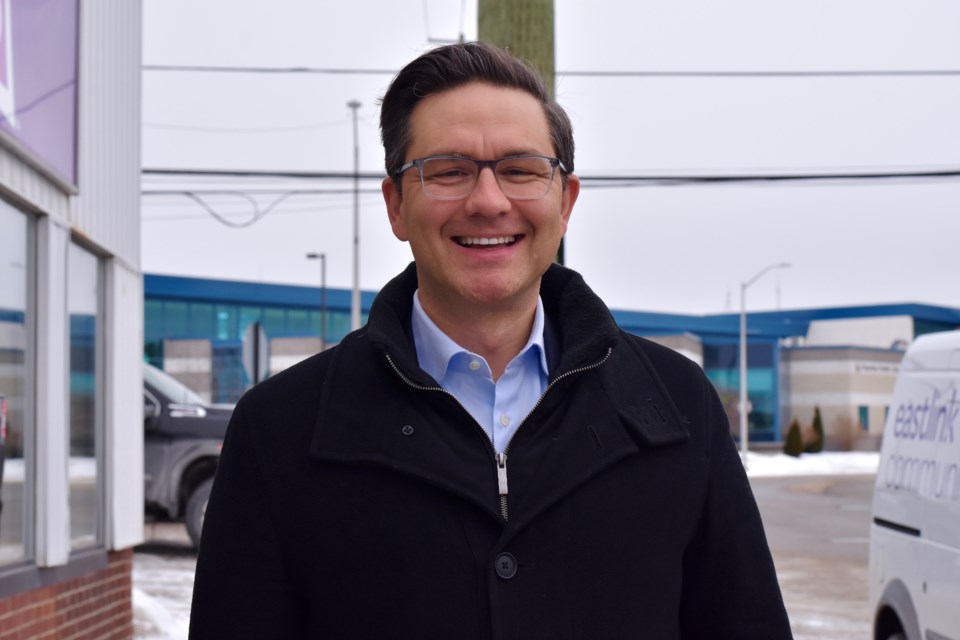Meeting with people on the street and in coffee shops, Pierre Poilievre says people are hurting.
Ahead of a town hall at the Senator Hotel in Timmins Friday, the Conservative Party of Canada leader spent the day talking to local businesses and groups to get to know what people's lives are like right now.
"Well, people are struggling. Life’s not easy right now," he said.
Before sitting down to talk with TimminsToday, he met a woman in a coffee shop. She's raising two grandkids and is paying $2,000 a month to rent a three-bedroom apartment.
"Then she said she’s baking bread and selling it on Facebook so that she can afford money for groceries and she’s worried about the violence in the community and the drug crisis that she sees on the streets. And these are the kinds of stories I’m hearing everywhere," he said.
"Everything feels like it’s broken right now and people are hurting and I want to transform that hurt into hope. I think Timmins has a very bright future, but the government needs to reverse course to make that possible."
To make life more affordable, he wants to cap government spending and speed up the approval process for mining projects needed for the future of energy.
"Big city people are buying electric cars, but that does no good for the environment if the batteries come from highly polluting, foreign dictatorships. We have the minerals to make those batteries here in Canada, but we have to speed up the permitting to get the mines that will provide them,” he said.
He wants to scrap the carbon tax and instead fight climate change by making carbon-free alternatives cheaper.
"That means quicker and safer approvals of nuclear power and hydroelectric power that has no emissions but can energize the electric car future. I also want to make it possible for our energy sector to bury carbon back in the ground where it came from. These are some practical ideas that will actually protect the environment rather than making life more expensive,” said Poilievre.
A Plan for First Nations
Since 2015, when the Truth and Reconciliation Commission released its final report, only 13 of the 94 Calls to Action have been met. A report released last year said at that pace, it will take about 42 years to meet all the calls.
Polievre said he "absolutely" wants to meet the calls, as well as give First Nations more control of their lives.
"The Indian Act is a horrible stain on our country. It is a racist, paternalistic, top-down, colonial law that remains in place that keeps all of the dominance and power in the federal government. The first section says this Act shall be called the Indian Act, the second section says all of the lands and money on reserve are owned by the Crown. Basically, that’s all you need to know," he said.
To give Indigenous people more control over their land, money and resources, Poilievre wants to fight to allow groups to "opt out of the financial and land rules of the Indian Act and also to control more of the resource revenue that’s generated on their ancestral lands."
Right now, Poilievre said, money generated from resources on Indigenous land goes to Ottawa and communities have to apply to get it back.
“I would like us to give First Nations control over that money and that would allow them to control the money their lands generate for their own people’s benefits,” he said.
He did not meet with any local Indigenous leaders on this trip to Timmins. He said he intends to on his next way through.
The new leader wants to visit a northern Ontario city roughly every month. North Bay is likely up next, with Sudbury, Thunder Bay and other municipalities on the list as well.
While Timmins has been held federally by the NDP's Charlie Angus since 2004, Poilievre believes the riding is winnable for the Conservatives. One reason he gave is that people are "fed up" with the NDP/Liberal coalition.
“I’m the only one that’s going to get rid of this hunting rifle ban, that will axe the carbon tax and get our resources developed. My policies on those things are very popular in places like Timmins and North Bay and Thunder Bay and other Northern Ontario communities,” he said.
